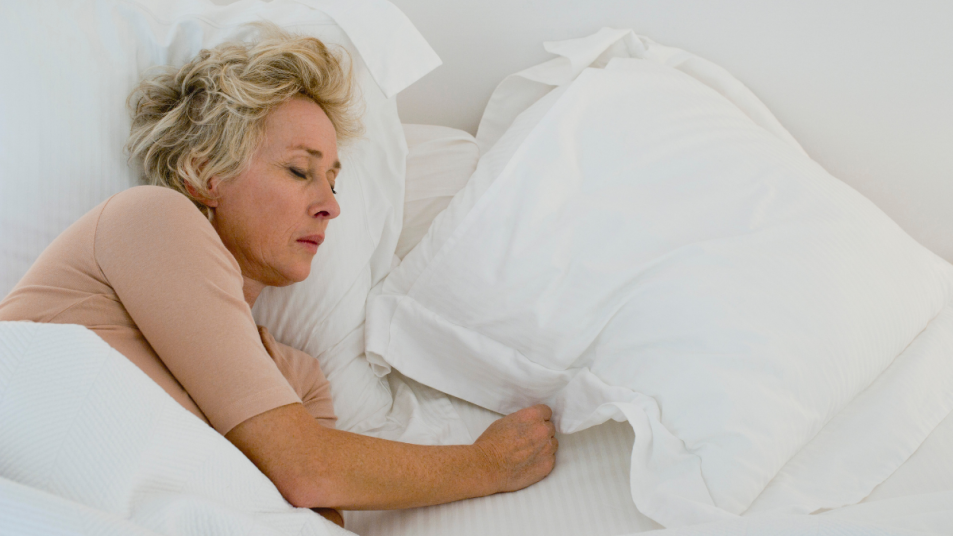7 Natural Remedies for Curing Insomnia and Getting a Full Night’s Rest

Struggling with sleepless nights? These easy fixes cure insomnia triggered by everything from spring temperature swings to pesky nightly worries.
Soothe achy knees with a ginger wrap.
Sore knees keeping you up at night? Blame spring’s shifts in temperature and barometric pressure, which worsen osteoarthritis (OA) pain, say Tufts Medical Center scientists. To ease pain and sleep soundly, dampen a washcloth with strong-brewed warm ginger tea, then drape over sore spots for 30 minutes. Australian scientists suggest doing so daily cuts pain by nearly 50 percent and improves range of motion by 31 percent in a week. The herb’s anti-inflammatory compounds (gingerol and shogaol) are absorbed through the skin to ease uncomfortable swelling.
Massaging the top, bottom, and both sides of the kneecaps daily also calms OA pain by 73 percent and stiffness by 66 percent in four weeks, a Chinese study found. Stimulating these spots sends a signal to the body to quell inflammation and curb your insomnia.
Lengthen sleep with ‘play dates.’
Take advantage of the beautiful spring weather and meet a friend for coffee at an outdoor café or take a walk together in the park. Reconnecting with loved ones on “play dates” leads to deeper, longer Zzzs, reveals a new study in Sleep Health. Spending quality time together strengthens your relationship, and that reassuring sense of belonging wards off sleep-disrupting stress.
Doze off faster with a ‘hand bath.’
No more lying awake wondering when your body and mind will finally relax enough to drift off. A new Japanese study shows that dipping your hands in a bowl of warm water for five minutes, then massaging your favorite lotion into your hands and forearms before bed, helps you fall asleep 20 percent faster. This ritual calms the sympathetic nervous system, which is likely overactive from you being cooped up indoors the past few months, allowing you to unwind.
Stay away from electronics.
Instead of watching TV and worsening your insomnia, catch up with your favorite magazine or a good paperback before bed. A new Chinese study found steering clear of electronics half an hour before hitting the hay helps you fall asleep 12 minutes faster. Researchers say skipping technology close to bedtime reduces arousal in the brain and markedly heightens relaxation.
End overnight ‘gotta go’ with vanilla.
To snooze soundly, add three drops of vanilla to a cotton ball, then tuck it into your pillowcase before bed. Japanese scientists say inhaling the scent as you sleep curbs the need for overnight bathroom breaks. Aromatic compounds vanillin and vanillyl alcohol reduce stress hormones, calming the bladder so it doesn’t spasm and trigger the urge to go.
Or turn up the tunes! High blood pressure puts extra pressure on the bladder. But blissing out with 30 minutes of slow-tempo tunes at night sends your BP plunging by nine points in a month, a study in The Journal of Clinical Hypertension shows, curbing nature’s call.
Ease snoring with a towel.
If you find yourself snoring lately, chalk it up to dry air, Brazilian scientists say. Though the weather is warming up, spring air still has up to 50 percent less moisture than in the summer. This dries out delicate nose and throat tissues, triggering vibrations that disrupt your sleep. The fix: Drape a damp towel over a hanger and put it up in your bedroom. A Chinese study found this more than doubles the amount of indoor humidity as water evaporates from the cloth.
Or spice things up. Flavor meals with tasty spices like oregano or basil instead of salt, and you’ll snore less, a study in Sleep found. Excess salt causes a buildup of fluid that travels to your neck when you lie down, putting pressure on your airway. But curbing your salt intake nips the issue in the bud, easing the pressure that triggers snoring.
Calm restlessness by barbecuing.
Tossing and turning? Savor more protein, like a turkey sandwich or barbecue chicken. Research out of Singapore shows that folks who get 30 percent of their food from protein sources have 35 percent longer, sounder sleep than those getting less. The tryptophan in these foods replenishes a late-winter shortfall of the body’s sleep-promoting hormones serotonin and melatonin.
Or try tulip peeping! Getting 10 minutes of midday sun, like admiring flowers on a walk, ups the production of vitamin D, which Italian scientists say helps regulate the body’s sleep/wake cycle for sounder sleep and less insomnia.
This article originally appeared in our print magazine.












